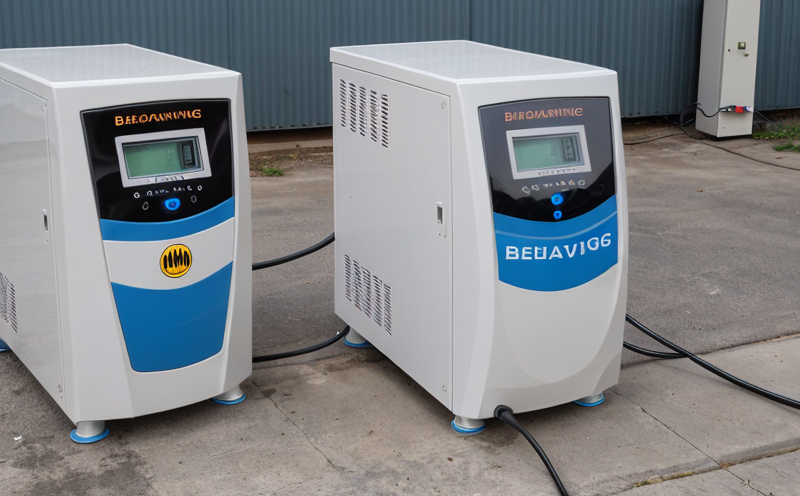GB/T 31485 Charging and Discharging Testing of Lithium-Ion Battery Packs for Safety
The GB/T 31485 standard is a crucial guideline for the safety assessment of lithium-ion battery packs used in various applications, including electric vehicles (EVs), energy storage systems (ESS), and consumer electronics. This testing ensures that battery packs meet stringent safety requirements to prevent overcharging, overheating, short circuits, and other hazards that can lead to catastrophic failures.
The charging and discharging behavior of lithium-ion batteries is critical for their performance and longevity. GB/T 31485 specifies detailed protocols for simulating real-world conditions under which the battery pack will operate. This includes controlled charging rates, discharge profiles, temperature cycling, and voltage thresholds to evaluate the overall safety margins.
The testing process involves several key steps:
- Preparation of Battery Packs: The battery packs are prepared according to the standard specifications, ensuring they meet the required cell count and configuration.
- Initial Charging Profile: The battery pack is subjected to an initial charging cycle that adheres strictly to the prescribed voltage limits and time frames. This step ensures that the batteries are fully charged before testing begins.
- Discharge Profile: Following a pre-set discharge profile, the battery pack undergoes a series of cycles designed to simulate real-world usage scenarios. The discharge rates vary based on the application requirements, ensuring that the battery's performance is evaluated under stress conditions.
- Temperature Cycling: To ensure thermal stability, the battery packs are subjected to temperature cycling between specified limits. This step helps in identifying any potential thermal runaway risks.
- Overcharge and Overdischarge Testing: The battery pack is intentionally overcharged or over-discharged to test its resilience and safety features. Any signs of abnormal behavior are meticulously recorded.
- Safety Feature Verification: The integrity and effectiveness of the built-in protection mechanisms like thermal fuses, voltage monitors, and current limiters are verified during these tests.
- Post-Test Evaluation: After completing all cycles, the battery pack undergoes a final evaluation to ensure that it meets all safety criteria as defined by GB/T 31485. Any deviations from the standard specifications indicate potential hazards that need addressing.
The results of these tests are thoroughly analyzed and reported in compliance with the standard's requirements. This ensures that the battery pack not only meets but exceeds safety expectations, thereby enhancing reliability and safety for end-users.
By adhering to GB/T 31485, manufacturers can ensure their lithium-ion battery packs meet stringent safety standards, which is essential for both regulatory compliance and consumer trust.
Benefits
- Enhanced Safety: Ensures that the battery pack meets all necessary safety requirements to prevent hazards such as overheating or short circuits.
- Regulatory Compliance: Helps manufacturers comply with international standards, ensuring their products meet legal and regulatory requirements.
- Improved Product Quality: Identifies potential issues early in the development process, allowing for timely corrections to ensure product quality.
- Increased Consumer Trust: Demonstrates a commitment to safety, which can significantly enhance brand reputation and consumer confidence.
- Risk Mitigation: By identifying potential risks through rigorous testing, manufacturers can mitigate the risk of costly recalls and liability issues.
- Competitive Advantage: Meeting stringent safety standards can set a product apart in competitive markets, enhancing its appeal to consumers and regulatory bodies alike.
Why Choose This Test
- Precision: GB/T 31485 provides precise protocols that ensure accurate evaluation of the battery pack's charging and discharging behavior under controlled conditions.
- Comprehensive Testing: The test encompasses a wide range of scenarios, including overcharge and overdischarge testing, ensuring comprehensive coverage of potential hazards.
- Standardized Procedures: Adhering to internationally recognized standards ensures consistency in testing procedures across different laboratories and jurisdictions.
- Expertise: Our experienced staff are well-versed with the nuances of GB/T 31485, ensuring that tests are conducted with the highest level of expertise.
- Confidentiality: We maintain strict confidentiality regarding our clients' proprietary information and testing results.
- Supportive Documentation: Detailed reports and certificates provide comprehensive documentation for regulatory compliance and marketing purposes.
Competitive Advantage and Market Impact
Adhering to GB/T 31485 can significantly enhance a manufacturer's competitive advantage by ensuring that their products meet the highest safety standards. This is particularly important in sectors such as automotive, energy storage systems, and consumer electronics where safety concerns are paramount.
By demonstrating compliance with this standard, manufacturers can:
- Gain Market Entry: Meet regulatory requirements for entry into domestic and international markets.
- Increase Sales: Attract customers seeking reliable and safe products by showcasing their adherence to stringent safety standards.
- Better Negotiations: Use the results of these tests in negotiations with suppliers, distributors, and partners to secure better terms and conditions.
- Enhance Brand Reputation: Establish a reputation for quality and reliability that can significantly enhance brand image and customer loyalty.
The market impact is also significant. Consumers are increasingly prioritizing safety in their purchasing decisions, making compliance with GB/T 31485 a crucial factor in gaining consumer trust and acceptance.





